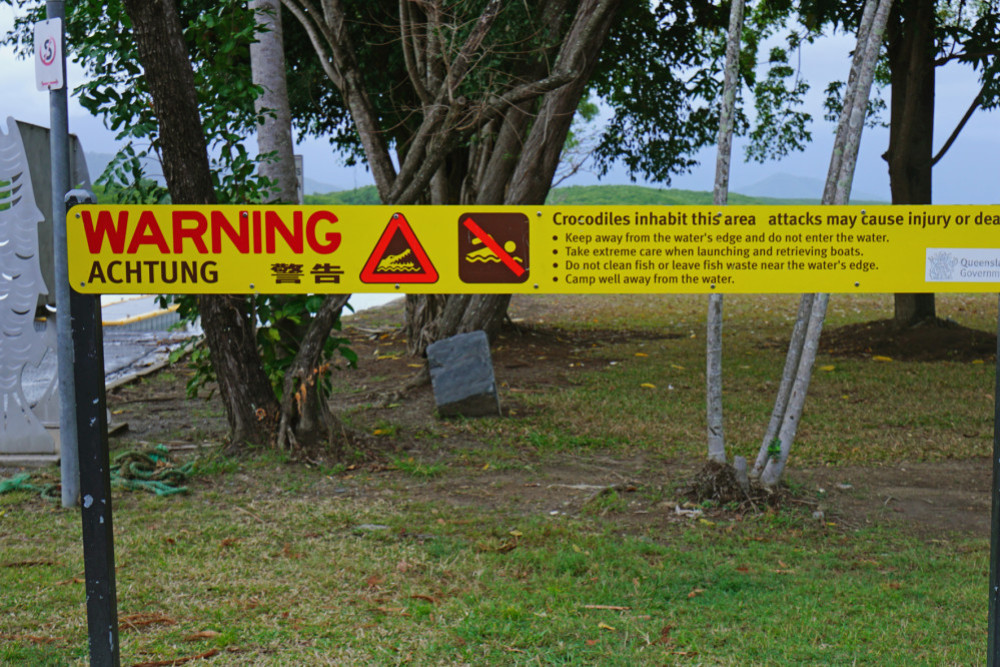General News
10 June, 2021
Call for crocodile tagging and tracing
A PORT Douglas tour operator is calling for the Queensland government to learn from the success of Western Australia’s ‘SharkSmart’ shark tagging program and start tagging and tracking crocodiles to protect people and tourism in the far north without harming the crocodiles.

Brett Wright has been running kitesurfing and stand up paddleboarding tours at Four Mile Beach, nearby islands and on the Mossman River for 20 years and said the number of crocodile sightings had increased over that time.
Under the Queensland Department of Environment and Science (DES) Crocodile Management Plan, Four Mile Beach is designated as ‘Zone D’, a ‘transitory zone,’ which means crocodiles may pass through, but it isn’t a core habitat for them.
In Zone D, crocodiles two metres or greater in length and any crocodiles displaying dangerous behaviour are targeted for removal, but the DES website states that it is generally very difficult to remove crocodiles from open water.
Mr Wright said with this in mind, crocodiles in river systems should be tagged and tracked so authorities, tour operators and the public could be warned when the crocs came out of the rivers and passed through the waters of Four Mile Beach or any other public beach.
“In March when I was away on holidays, a crocodile was sighted at four-mile beach right near where I normally do paddle boarding and kite surfing,” he said.
“I’ve been teaching there for 20 years and have never seen a crocodile before.
“As far as I know, that one has not been removed and it’s probably gone back into the river, but who knows when it will come out again?
“I’ve also seen crocodiles at Lowe Isles before and the last one I saw, it took them two weeks to go out and remove it.
“They were only small ones. Nobody has been harmed. My tours are safe. We always do the appropriate checks and stay in safe areas, and we’ll cancel if we have to. But it definitely damages our image and affects bookings.
“Now, every day I get enquiries from tourists worried because they’ve heard stories about crocodiles.
“We don’t want to end up like the Northern Territory where people just don’t go in the water.
“Let’s start tagging these crocodiles so we can have more certainty around their location on a daily basis.”
Mr Wright said Western Australia’s ‘SharkSmart’ strategy was a great example of how a government could protect the public and the tourism industry from dangerous wildlife, without culling them.
RELATED: DES says tagging is ineffective
In 2018 Western Australia’s world-famous Margaret River Masters surfing competition was cancelled after two shark attacks, and since then the WA Government has committed more than $28.6 million to its shark hazard mitigation strategy to protect both its people and its tourism industry.
The strategy includes fitting sharks with acoustic tags and installing acoustic receivers at beaches to detect when they are near, and the data is then provided to authorities and the public in near real-time via the ‘SharkSmart’ app.
Brett’s father, Peter, is leading the campaign for more crocodile management innovation in Queensland by engaging in talks with the local Jabalbina Aboriginal Corporation and has also obtained a letter of support from the Douglas Local Marine Advisory Council, which provides advice to the Great Barrier Reef Marine Park Authority.
Crocodile Safety Australia scientists Dr Adam and Erin Britton from Big Gecko Crocodilian Research said the DES’ existing strategy was effective however more investment in research into innovative management options for crocodiles would be “a good thing.”
“Can it be improved using technology? Very likely, yes. Drone monitoring has been tried and tagging and tracking individuals is another approach. Is it cost-effective? That’s another thing that needs investigating,” said Mr Britton.
“None of these approaches alone is a silver bullet though, they work together to reduce risk.
“Knowing where tagged individuals are will certainly reduce risk from those crocodiles, but what about crocodiles that are not tagged and move into the same area?
“This is a realistic possibility, so you’d still need to apply the usual combination of existing management, safety and common sense. But while not eliminating risk, it would very likely make it safer, and that makes it
worth considering.”


